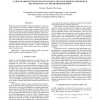Free Online Productivity Tools
i2Speak
i2Symbol
i2OCR
iTex2Img
iWeb2Print
iWeb2Shot
i2Type
iPdf2Split
iPdf2Merge
i2Bopomofo
i2Arabic
i2Style
i2Image
i2PDF
iLatex2Rtf
Sci2ools
126
Voted
ICASSP
2010
IEEE
2010
IEEE
Large margin estimation of n-gram language models for speech recognition via linear programming
We present a novel discriminative training algorithm for n-gram language models for use in large vocabulary continuous speech recognition. The algorithm uses large margin estimation (LME) to build an objective function for maximizing the minimum margin between correct transcriptions and their competing hypotheses, which are encoded as word graphs generated from the Viterbi decoding process. The nonlinear LME objective function is approximated by a linear EM-style auxiliary function that leads to a linear programing problem, which is efficiently solved by convex optimization algorithms. Experimental results have shown that the proposed discriminative training method can outperform the conventional discounting-based maximum likelihood estimation methods. A relative reduction in word error rate of over 2.5% has been observed on the SPINE1 speech recognition task.
Discriminative Training | Discriminative Training Algorithm | ICASSP 2010 | Signal Processing | Speech Recognition |
| Added | 06 Dec 2010 |
| Updated | 06 Dec 2010 |
| Type | Conference |
| Year | 2010 |
| Where | ICASSP |
| Authors | Vladimir Magdin, Hui Jiang |
Comments (0)

